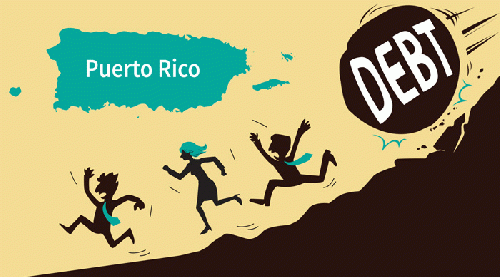There are several conjectures on the factors that may cause Puerto Rico's unsustainable indebtedness. To verify the empirical validity of the most popular conjectures, I will refer to the movements in real debt (adjusted by inflation) since any plausible thesis should be able to explain why the total debt grew unsustainably after 1995 and not before.
One hypothesis is that a "giant" government inflated the government payroll, thus increasing the need to borrow. There is no academic study showing that the problem is an inflated government payroll. The proportion of government employees to the population 16 years and older was lower in 2001 than in 1988, when there was no debt problems. In fact, the proportion of government workers to the population aged 16 to 64 was 10.3% in 2013 in the US, whereas in Puerto Rico it was only slightly higher at 11.2%, thus reducing the validity of this claim.
Another hypothesis is that reckless and corrupt administrations caused this debt crisis. I acknowledged that fiscal mismanagement has exacerbated this crisis. However, there are studies showing that the (low) quality of administrators was similar from 1975 to 2000, and there is no evidence that the corruption of the 2000's was worse than the corruption in the 1970s or 1980s when there was no debt crisis. Someone can argue about a cumulative effect of the fiscal mismanagement, but debt actually decreased from 1977 to 1987.
Another thesis is that the colonial status of Puerto Rico caused the indebtedness. Without doubts the political status has diminished the ability of Puerto Rico to design its economic strategies. However, the colonial status has not changed in more than 50 years but the unsustainable debt started in the middle 1990s. There is also no sign of a cumulative effect in the 1980s. The colonial status is responsible for the lack of legal mechanisms to resolve the debt crisis, since the US courts blocked a local bankruptcy law (Act 71 of 2014) and the Congress does not let the government-owned corporations to fill bankruptcy under the federal law. Thus, the colonial status has caused the indebtedness in the recent years.
Another thesis is that, in the long term, this debt crisis was caused when the Puerto Rican economy crashed after the US authorities removed the industrial incentives provided to Puerto Rico, under section 936 of the federal tax code, without any substitutable economic strategy. This deindustrialization reduced the government revenues, and increasing the dependency on external funding.
One major cause of the debt crisis is that the proportion of manufacturing employment decreased 50% from 1995 to 2014. In 1995 manufacturing represented 42% of their Gross Domestic Product, creating more than 30% of the local bank deposits, and generating 17% of the total direct employment (that is, without accounting for the large indirect employment resulting from local firms providing services to these factories and from consumption of these high-wage workers). It is far from coincidence that when the transition period of section 936 ended in 2006 Puerto Rico entered the largest economic depression in more than 100 years. I verified the relationship between this deindustrialization and indebtedness with advanced statistical methods in a recent paper submitted to an academic journal.
Thus, the US has a large responsibility with Puerto Rico's crisis, and each branch of the US political system could help but they prefer to remain indifferent. On the one hand, the Treasury could endorse new Puerto Rican bonds in order to refinance its debt with lower interest rates, and can also enhance tax credits for the US companies paying taxes in Puerto Rico. On the other hand, Congress could let the government-owned corporations apply for Chapter 9 (as any other government-owned corporation in the US); could remove the transportation laws that force Puerto Ricans to exclusively contract expensive US vessels; could implement new industrial policies, and could provide equality in the distribution of Medicare and Medicaid funds. The Federal Reserve could implement many programs describe by Professor Arturo Estrella in a recent study. The US Supreme Court could authorize the local bankruptcy law. But it would appear that the interests of the few (bondholders and transportation companies, among others) are more important than the well-being of 3.6 millions US citizens in a forgotten colony.
More than five millions of Puerto Ricans in the US, especially in Florida (a key electoral state), and other Latinos are taking notes.
(Article changed on December 11, 2015 at 11:32)





